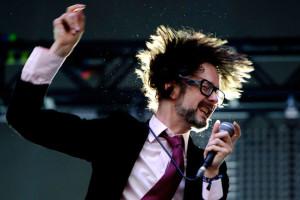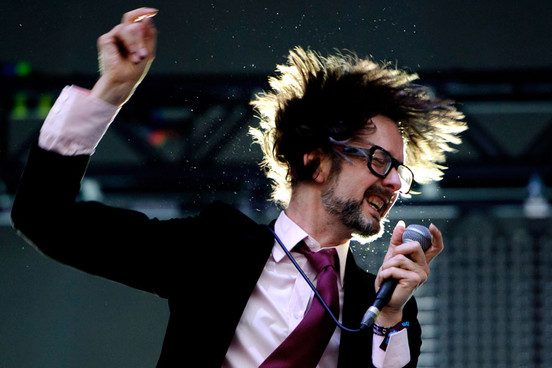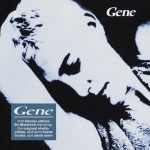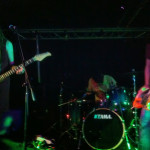
In America, it was always different. Being a Britpop – while it was happening – fan in Boston was like being part of a very small and very loosely-knit secret club, so secret in fact, members didn’t even really know they were in it. Perhaps shyly nodding in acknowledgement of the others, never more than say 30 people max, who’d show up every week to Mod Night or The Pill to dance to “Advert”, “The Beautiful Ones” and “Disco 2000” (Mod Night introducing me to The Wannadies with “Hit” and The Pill to Spearmint via “We’re Going Out”). You’d go with your friends who just wanted a drink and who’d stay by the bar while you spun around on the dancefloor to the extended version of “I Am The Resurrection”.
As an American, it was always different. I would buy Select magazine every month, stacks of them still at my parents’ house now, and sought out every band, even the ones in the quarter-page articles at the beginning. I fondly remember when it was Blur vs. Suede, before Oasis even existed. And the hundreds of thousands of people reveling ecstatically in this cultural phenomenon you’d see in the magazine pages was a world away from the few of us who’d show up to Newbury Comics on a new release day hoping the 3 or 4 copies they’d got in of Coming Up, The Great Escape or Different Class hadn’t already been snatched up by someone else. I’d buy bootleg cassettes of festival dates or radio gigs of these fascinating bands from the two Mystery Train record shops. It took me 4 years – until A Tribute to Polnareff was released – to find out what the amazing French song from Pulp’s 1994 Black Session was (“Le Roi De Fourmis”). And I had a recording of the legendary Glastonbury ’95 performance very soon after. But it could never be the same.
When the British bands would come, they’d play small to medium-sized clubs, to our delight and for the most part their chagrin. And you’d see those like-minded souls at the gigs; faces in the crowd that much later became best friends and musical collaborators. I saw The Boo Radleys, Gene (7 times!), Pusherman and Space to name but a few in tiny venues. I remember after all I’d read about Menswe@r, being disappointed they had to fly back for TOTP when they should’ve been supporting The Charlatans (UK as it had to be written ; ). Many an excellent Blur show at the slightly bigger clubs alongside Fenway Park. Damon even commented upon this onstage – “Goodbye Lansdowne Street” – once “Song 2” hit and they’d moved up to theatres. I was lucky enough to see Suede on both Dog Man Star and Coming Up. The latter being the two Boston shows where the equipment was stolen overnight. Instead of canceling, they bought acoustic guitars and played THE BEST GIG YOU COULD POSSIBLY IMAGINE on the second night, ending with “My Dark Star”. But I never got to see Pulp.
September 15, 1994 Pulp supported Blur at the Venus De Milo club on Lansdowne Street. This was my first week in Boston and I still hadn’t got the hang of things, arriving just as the crowd was exiting, it having been an early show. The next time they came my little sister was graduating high school. I would’ve loved to have seen them. Britpop coincided with, and largely soundtracked, being out on my own for the first time and realizing that life could be whatever you wanted to make it. And after many nights of coming home from doing just that, I’d put on His & Hers or Different Class and watch the sunrise out the window with a feeling of wonder and excitement, a sense of magic, thankful that there existed music this good that somehow expressed everything I was feeling.
Yesterday, after 17 years, I finally got to see them. And the sense of magic was strong as ever; throughout the whole day too as friends materialized ‘just like that’ as we wandered through the thousands clearly enjoying themselves. Then it was time. A black screen covered the stage, scrolling projections of Jarvis-esque banter, ripped down as they launched into “Do You Remember The First Time?” When it kicked in for the chorus, lights flashed and millions of streamers burst over the crowd. Tears involuntarily streamed down my face from years of accumulated meaning, as was to happen multiple times throughout the gig. And I thought ‘this is what a perfect world would be like’ – a joyous celebration, people as far as the eye could see jumping up and down, arms around one another, ecstatic, with Pulp as the soundtrack. “Pink Glove” was next and I was overjoyed. This has always been my favourite Pulp song and one of my favourite songs full-stop. It’s got everything, doesn’t it? An enormous feeling was in the air – a reminder of every time you ever felt that life was overwhelmingly wonderful and exciting, every time you despaired at its insidious twists and long stretches of angst and boredom, everyone who ever broke your heart and everyone who ever filled it so much you thought it might burst, every fumble in a backseat (hey, I’m American), every bedroom transcendence or awkwardness, everything. EVERYTHING.
“Mile End” always holds a special place in my heart because when I first moved to London and was looking for a place to live, I went to the places mentioned in Pulp, Suede (Seven Sisters) and Blur (Ladbroke Grove) songs. Then into an IMMENSE “Mis-Shapes”, oceanic waves of frenetic energy sweeping the crowd. Jarvis picked up an acoustic guitar for “Something Changed” and then fittingly wished Laura Branigan “Happy Birthday” before launching into “Disco 2000”. Overall we got almost the entirety (but 3) of Different Class with “Sorted”, “F.E.E.L.I.N.G.” and “I Spy” coming next. Jarvis began a dedication to his mum, who was there, saying it would seem inappropriate considering the lyrics, then extending it to his son and finally all of us since we were all “Babies” once. Which made me laugh because I remembered making a girl I liked a mixtape in 1997 with “Babies” on it and her thinking that was quite strange. “Underwear” was brilliant, another of my all-time favourites, being the first Pulp song I ever heard. “This Is Hardcore” slunk along very sexily indeed, brought into the surreal when 3 teenage Icelandic girls began applauding my girlfriend and I making out. “Sunrise” just as the sun was almost completely down was a nice touch. “Bar Italia” took me back to staring out my window at 6 a.m. in 1996, and another place I sought out when I first got to London. And the atmosphere when they closed with “Common People” was simply triumphant, which felt amazing to be a part of. I’m not one to sing along at gigs, not wishing to annoy my neighbors who’d surely rather be listening to the singer unaccompanied, but when “Common People” began my mouth opened of its own accord and shouted joyfully along with everybody else. It was an incredibly special evening and I’m thrilled I got to be a part of it.
A final word and perhaps the ultimate compliment an American can pay – Jarvis was the best frontman I’ve ever seen, even better than David Lee Roth. He jumped and flailed about the stage like a man half his age, though a man half his age could never possess such stores of panache and style. David Barnett and I, on a very convoluted post-gig journey back to North London, discussed how universally loved Jarvis is and concluded that it’s simply because he’s himself.
In many ways it made sense to see Blur, with their art-school leanings and quirky British songs, and Suede, with their highly-stylized sense of melodrama, in those intimate venues years ago. But it felt RIGHT to see Pulp for this first time in this setting. A festival with thousands of adoring fans going mad. For it was, and they are, a celebration, not just of their success – hard-fought, hard-won, and enormously deserved – but of Life, and EVERYTHING it has to offer.




